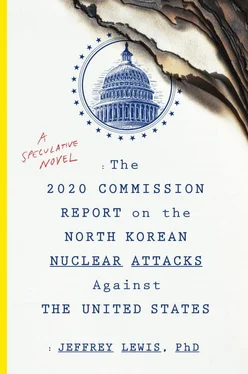Jeffrey Lewis - The 2020 Commission Report on the North Korean Nuclear Attacks Against the United States
Здесь есть возможность читать онлайн «Jeffrey Lewis - The 2020 Commission Report on the North Korean Nuclear Attacks Against the United States» весь текст электронной книги совершенно бесплатно (целиком полную версию без сокращений). В некоторых случаях можно слушать аудио, скачать через торрент в формате fb2 и присутствует краткое содержание. Город: New York, Год выпуска: 2018, ISBN: 2018, Издательство: Mariner Books, Жанр: Фантастика и фэнтези, Триллер, на английском языке. Описание произведения, (предисловие) а так же отзывы посетителей доступны на портале библиотеки ЛибКат.
- Название:The 2020 Commission Report on the North Korean Nuclear Attacks Against the United States
- Автор:
- Издательство:Mariner Books
- Жанр:
- Год:2018
- Город:New York
- ISBN:9-781-328-57391-9
- Рейтинг книги:4 / 5. Голосов: 1
-
Избранное:Добавить в избранное
- Отзывы:
-
Ваша оценка:
- 80
- 1
- 2
- 3
- 4
- 5
The 2020 Commission Report on the North Korean Nuclear Attacks Against the United States: краткое содержание, описание и аннотация
Предлагаем к чтению аннотацию, описание, краткое содержание или предисловие (зависит от того, что написал сам автор книги «The 2020 Commission Report on the North Korean Nuclear Attacks Against the United States»). Если вы не нашли необходимую информацию о книге — напишите в комментариях, мы постараемся отыскать её.
The 2020 Commission Report on the North Korean Nuclear Attacks Against the United States — читать онлайн бесплатно полную книгу (весь текст) целиком
Ниже представлен текст книги, разбитый по страницам. Система сохранения места последней прочитанной страницы, позволяет с удобством читать онлайн бесплатно книгу «The 2020 Commission Report on the North Korean Nuclear Attacks Against the United States», без необходимости каждый раз заново искать на чём Вы остановились. Поставьте закладку, и сможете в любой момент перейти на страницу, на которой закончили чтение.
Интервал:
Закладка:
Over the next few hours, the horror of the day repeated itself again and again, immeasurably. The nuclear weapon that fell directly on Manhattan exploded with the force of 200 kilotons—about ten times the power of the bomb that leveled Hiroshima. The two bombs that hit the Washington metropolitan area leveled much of the northern Virginia suburban area—home to more than three million people—but missed the White House, which was largely empty. And another nuclear weapon fell on Pearl Harbor.
On the ground, survivors were beginning to collect themselves. In New York City, Nikki Haley’s apartment building at UN Plaza had been heavily damaged in the explosion, but it was still standing. She recalled that the windows had been blown out and the building had bent over so far under the pressure that she felt it might snap, before it rocked back violently, swaying like a ship on rough seas. “When I came to, I was anxious to know what happened to my son,” she recalled. “I thought, I have to go, I have to go and find him .”
There was no electricity or water, and the building’s windows had been blown out. Haley lived in the penthouse, fifty stories above the city, and the wind was fierce. Although injured, she walked down the interior stairwell all the way to the ground level and then began to make her way down FDR Drive toward the school where her son had spent the morning in a spring tennis program.
“I saw a young boy coming my way,” she told the commission later. “His skin was dangling all over and he was naked. He was muttering, ‘Mother, water, mother, water.’” she recalled. “I thought he might be my son, but he wasn’t. I didn’t give him any water. I am sorry that I didn’t.”
In the confusion and horror that followed each nuclear strike, the main impulse of many survivors was to move to safety—either to find help or offer help to others. Many survivors also tried to find friends and family members. This was difficult in the darkness, with collapsed buildings and mangled cars blocking roadways.

[Name withheld], Arlington, VA:I looked next door and I saw the father of a neighboring family standing almost naked. His skin was peeling off all over his body and was hanging from his fingertips. I talked to him, but he was too exhausted to give me a reply. He was looking for his family desperately.
[Name withheld], Jupiter, FL:I really thought I was dying because I drank so much water. I don’t know how many minutes passed, but anyway I found something like a piece of wood, but it was very soft and sticky. I touched it. It was actually my friend’s leg. She was alive, and we were so glad to see each other.
For many survivors in urban areas, the most intense memories in the immediate aftermath of the strike were the enormous amounts of rubble and ash left by the tall buildings that collapsed—and the cries in the darkness coming from underneath the debris. Many people were buried completely, while others were simply trapped by debris or so seriously injured that they could not move.
[Name withheld], New York, NY:I couldn’t see anyone around me, but I heard somebody shouting “Help! Help!” from somewhere. Then I realized that the cries were actually coming from beneath the rubble I was walking on.
[Name withheld], New York, NY:I found one of the other kids in the school alive. I held him in my arms. It is hard to say this: his skull was cracked open, his flesh was dangling out from his head. He had only one eye left, and it was looking right at me. First, he was mumbling something, but I couldn’t understand him. I held his hand, and he started to reach for something in his pocket, so I asked him, I said, “You want me to take this along to hand it over to your mother?” He nodded. I thought I could take him along. I guess that his body below the waist was crushed. The lower part of his body was trapped, buried inside of the debris. He just [refused] to go, he told me to go away.
With the widespread destruction and collapse of infrastructure, millions of people began to simply walk out of the destruction zone. Over the course of the afternoon and well into the night, millions of people walked along expressways and over bridges to escape the misery and suffering within the cities. While many eventually made it home after walking ten or even twenty miles, many tens of thousands did not, falling along the way; the escape routes were littered with the bodies of men, women, and children.
The president, over the course of the first few hours of the North Korean attack, grew increasingly agitated in his isolation. He insisted that aides put him in contact with Secretary of Defense Mattis. Communicating with anyone, however, was nearly impossible. As reports of nuclear explosions in the United States appeared on television, the volume of text messages, social media postings, and telephone calls quickly overwhelmed the communications infrastructure. Moreover, government officials were beginning to follow procedures to evacuate to safety.
“Communications systems were overwhelmed with traffic,” one aide recalled. “Key officials were being evacuated in Washington, DC, and cell calls that got through were breaking up. Information was mixed with rumor. We had to switch to the military radio network. The president couldn’t reach key people on regular phones because people like the secretary of defense had abandoned buildings in DC. Cell phones were useless because the networks were saturated.”
During this early period, Mattis was engaged in the important process of shifting Department of Defense operations out of the Pentagon and into Site R, the massive underground complex in rural Pennsylvania. Mattis had given orders to transfer operations to the Pentagon’s deep underground, alternative command center as soon as the first missile launch had been detected. Although the complex was kept on a sort of warm standby, it would still take time—more than an hour—to get the staff into the facility and activate all of its communications systems. Mattis himself was in the air, en route to the site. During this period, he was simply not available to the president.
Unable to reach his secretary of defense, the president implored his remaining aides to find a way to contact his wife and children. He was particularly concerned about his wife Melania and their son Barron, who had been staying at Trump Tower. He was also demanding to talk to his daughter Ivanka and her husband Jared. They lived in Washington. Both cities were now under attack, and the president was desperate to know that his family members were safe.
If New Yorkers remember the rubble, people in Honolulu and northern Virginia—both largely suburban areas with wood frame houses—remember the fire. The intense heat of the explosions lit fires that grew steadily into firestorms, swallowing everything and everyone in their paths.
[Name withheld], Honolulu, HI:We felt terribly hot and could not breathe well at all. After a while, a whirlpool of fire approached us from the south. It was like a big tornado of fire spreading over the full width of the street. Whenever the fire touched, wherever the fire touched, it burned. It burned my ear and leg. I didn’t realize that I had burned myself at that moment, but I noticed it later.
[Name withheld], Arlington, VA:I still felt very thirsty, and there was nothing I could do about it. What I felt at that moment was that Virginia was entirely covered with only three colors. I remember red, black, and brown, but, but, nothing else. Many people on the street were killed almost instantly. The fingertips of those dead bodies caught fire, and the fire gradually spread over their entire bodies from their fingers. A light gray liquid dripped down their hands, scorching their fingers. I, I was so shocked to know that fingers and bodies could be burned and deformed like that. I just couldn’t believe it. It was horrible.
Читать дальшеИнтервал:
Закладка:
Похожие книги на «The 2020 Commission Report on the North Korean Nuclear Attacks Against the United States»
Представляем Вашему вниманию похожие книги на «The 2020 Commission Report on the North Korean Nuclear Attacks Against the United States» списком для выбора. Мы отобрали схожую по названию и смыслу литературу в надежде предоставить читателям больше вариантов отыскать новые, интересные, ещё непрочитанные произведения.
Обсуждение, отзывы о книге «The 2020 Commission Report on the North Korean Nuclear Attacks Against the United States» и просто собственные мнения читателей. Оставьте ваши комментарии, напишите, что Вы думаете о произведении, его смысле или главных героях. Укажите что конкретно понравилось, а что нет, и почему Вы так считаете.












